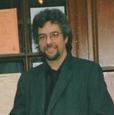Russia, in the late 80s was under the spell of a charismatic healer who came to the country on prime time every week on their TVs. Dressed in black, fixing his hypnotic gaze on viewers as they sat transfixed in their homes, he promised to cure the entire country. He performed “remote psychological anaesthetization.” Anatoly Kashpirovsky was a self-professed mass healer and hypnotist who made his name during the collapse of the Soviet Union. He was born on August 11, 1939 in the small Ukrainian city of Khmelnitsky. The broadcast was also one of the most powerful performances on TV and a powerful instrument for propaganda. He was called the “new” Rasputin. Russian streets would empty. Was he a healer or a spiritual con artist? During a recent series of interviews with Russian-born hypnotist and filmmaker Elena Beloff, I asked her about his work and his influence.
“Everyone who lived in Russia 1990's remembers Kashpirovsky, he was a sensation,” she said. “He broadcast live on National TV many times a week; people would be glued to their TV sets hoping for a miracle. I was about ten when it all happened. I was in total awe of what I saw, not because I believed in it, but because I was shocked how by many people unconditionally believed everything he said. They believed he possessed special powers, unlike anyone else. Later on we learned that he certainly had a strong sense of command and the ability to influence. People were naïve about what he was claiming to be able to do and they didn't ask questions, which made it easier for him to influence their opinions.”
In the early 1990s, after the collapse of Soviet Union, the Russian people craved spiritual answers to their problems and supernatural outlets to their frustrations after years of Soviet secularism. Beloff explains, “Russia was vulnerable. The country was in a state of shock after the drastic change in regime and transition to a market economy.” Kashpirovsky came under more intense inspection. As do many people who make metaphysical and thought-changing promises. “People started asking smart questions so Kashpirovsky went through the similar scrutiny that Anton Mesmer went through in 1778. Mesmer proclaimed to have special abilities to heal people using magnets. He was expelled from the community after Ben Franklin proved his healing abilities to be nothing more that the power of suggestion, not special powers. The same thing happened to Kashpirovsky. He was ridiculed by skeptics who asked questions about his abilities and who doubted his self-proclaimed special-ness," Beloff said.
In 1995 Anatoly Kashpirovsky left Russia and immigrated to the USA where he continued his hypnotic sessions. The majority of his patients were Russian expatriates. Beloff says “I think if he admitted his methods worked because of the power of suggestions and self-hypnosis he would have a chance to be accepted by society. All he did was helped people believe in themselves. He was ordinary just like everyone else, but he still seems to believe he has unexplainable special powers.” Beloff likens that to a placebo. “That doesn't work anymore, because people don't believe it. It is like telling a patient that a pill they are taking is fake, that it is sugar and not medicine. They stop believing and the pill doesn't work. “
As a hypnotist, Elena doesn’t claim Kashpirovsky as an influence, “but he certainly sparked my curiosity about how the mind worked.” Rather it fueled her skepticism “which lead me to study the history of hypnosis and hypnosis as a healing modality.”
Beloff isn’t sure if she believes in remote healing or psychic phenomenon, but believes that people are hungry for paranormal experience. “I think most people are still in shock that they were under such influence from Kashpirovsky, as if the whole nation was in a state of trance,” she concludes.
People believed in his power because “They wanted to believe in miracles. I believe he was able to do it because he was authoritative and very good with direct commands. I think his stoicism and physical appearance played a big part in his popularity. He projected a power and safety. This is biologically appealing to women and most of his followers were women. Sex appeal can consist both or either of physical or mental attributes. Confidence, strong mental attitude, posture, wit, sense of authority play a big part in sex appeal. Again it is all biological. Women are attached to power and men are attracted to beauty.”
There are currently many cases before the Supreme Court in several states about the right to choose faith over medical care as a form of healing. “Faith healing means healing that takes place based on unconditional belief into healing,” Beloff says. The belief in divine powers of healing is universal, not just in America and in Russia, but the world over. Beloff says “I don't think Kashpirovsky had any special powers that others don't have. He was not more divine than others, if you believe in divine. In reality we all have `special’ abilities when we get things done, when we focus, make up our minds about something and stay disciplined. If you can finish college with honors, write a book or a symphony, build a plant or make a film, quit smoking cold turkey, stay positive when your heart is aching, that is all special power.“
Elena Beloff is available for sessions, for more information please visit her site at www.insidehypnosis.com
Tony Sokol is a writer, playwright and musician. He currently contributes to Silver Tongue, Inside the Reel and Altvariety and has written for Diabolique, Wicked Mystic, Delirium and other magazines. He has had over 20 plays produced in NYC, including Vampyr Theatre and the rock opera “AssassiNation: We Killed JFK”. He appeared on the Joan Rivers (TV) Show, Strange Universe, and Britain’s “The Girlie Show.” He was born in Brooklyn, NY

Post new comment
Please Register or Login to post new comment.